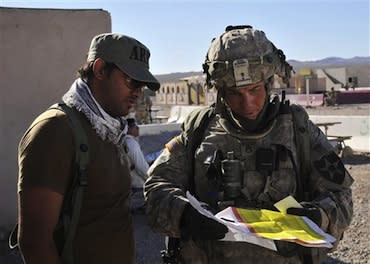 The Lookout
The LookoutSuspected Army shooter’s defense may argue Army didn’t see warning signs

The staff sergeant suspected of shooting 16 Afghan civilians, many of them children, had a trail of legal troubles behind him, and his defense team may use those to argue the Army didn't properly screen him before deployment, experts say.
Yesterday, Gary Liebschner from Carroll, Ohio, told ABC News that Robert Bales was ordered to pay him more than $1 million after an arbitrator ruled that Bales defrauded him the year before he joined the Army. Liebschner says he never received the sum. Bales was Liebschner's stockbroker, and wasn't charged criminally in the case.
During recruiting, the Army screens applicants' criminal history, and occasionally hands out "moral waivers" to applicants who have two or more misdemeanor convictions or one serious conviction so they can still join the force. (Murder and some other crimes cannot be waived.) In 2007, the Boston Globe reported that 12 percent of the Army's entire recruiting class had criminal records, a reflection of how badly the Army was struggling to meet its recruiting quotas then.
The Army won't release details of Bales' 11-year military record, so it's unclear if his fraud charges showed up in the background search the military did, or whether Bales needed a moral waiver to join the military. The AP reported that he also had a 1998 citation for possessing alcohol on Daytona Beach, and never paid the $65 ticket. That would most likely count as a minor nontraffic violation, which wouldn't require a waiver.
Once Bales joined up, he ran afoul of the law again, in incidents that suggested he may have had alcohol problems. He was arrested in an assault investigation involving a former girlfriend in 2002, but charges were dropped after he agreed to take anger management classes. According to the Seattle Times, the State Patrol arrested Bales in 2005 after finding that he had a blood alcohol level of .14 while driving. The legal limit in Washington is .08, but Bales was not charged. According to CBS, a 2008 police report said Bales drove into a signpost and then ran into the woods, "bloody and smelling of alcohol," according to witnesses. Bales paid a fine and the hit-and-run charges were dismissed.
Generally, the Army will formally reprimand a soldier if he or she is found to have broken the law, as in a drunken driving arrest, even when the arrest doesn't result in a conviction. A reprimand could slow a soldier's future promotions, and a more serious arrest could result in a discharge. But there's no automatic process for the Army to find out about civilian arrests, and it's possible for a soldier to take care of a lower-level offense on his own and not have his commander find out, says Eugene Fidell, an attorney and a lecturer at Yale Law School. In Bales' case, Fidell thinks the glowing reports from Bales' own comrades and commanders about his conduct would outweigh any concerns about his minor civilian offenses, assuming the Army did know about them.
But John Henry Browne, Bales' celebrity Seattle-area lawyer, may use Bales' run-ins with the law as part of a larger argument that the Army shouldn't have deployed him in the first place, and it may have improperly vetted his mental state. Browne has said his client may be suffering from post-traumatic stress disorder (PTSD), and told the AP after meeting with him in his cell in Fort Leavenworth, Kan., Monday that he has "very little" memory of the shooting incident. Bales suffered a traumatic head injury—which is correlated with higher rates of PTSD and violence—on one of his earlier deployments, but was cleared for a fourth tour of duty by the Army's screening process. (Browne didn't respond to requests for comment.)
Daniel Conway, a defense lawyer who represented a member of the "Kill Team," a group that was accused of killing Afghan civilians for sport, said that warning signs are often present in bad-apple soldiers. Jeremy Morlock, the convicted ringleader of the group, had several traumatic head injuries, substance abuse issues and domestic abuse charges, Conway says.
"You're starting to see in these cases over time some real common denominators, and at some point the Army's got to do a better job at vetting these individuals," he said.
Fidell said the defense may argue that the Army should have seen "indicators well in advance of this recent deployment that he was having problems in his life ... that maybe he wasn't the most suited to deploy." But Fidell isn't sure that will work so well, especially since Bales, if charged, will be tried in front of his military peers.
"It's going to be a tough row to hoe for them because he's not the only guy to have four deployments" he says. "To really push hard on the argument that the Army is responsible for this and make that pitch to a bunch of combat veterans who are hearing the case? That's not going to fly. One of the core ethics of military service is personal responsibility," he said.
Conway agrees. "It's going to be hard to get a military jury, many of whom have done multiple deployments themselves, to be that sympathetic of an individual who allegedly commits these types of acts, because they've been there and done that."
More popular Yahoo! News stories:
• Amelia Earhart mystery: Hillary Clinton announces U.S. support of new search
